Restorative Care
Crowns and Bridges
When a tooth is fractured, has a large old filling, or is severely damaged by decay, your dentist may recommend the placement of a crown. Crowns strengthen and protect the remaining tooth structure and can improve the appearance of your smile.
Types of crowns include the full porcelain crown, the porcelain-fused-to-metal crown (precious & non-precious) and the all-metal crown.
Fitting a crown requires at least two visits to the dentist's office. Initially, the Dentist removes decay and shapes the tooth; makes an impression and fits a temporary or transitional crown of plastic or metal. In a subsequent visit, the dentist removes the temporary crown, fits and adjusts the final crown and cements the crown into place.
BRIDGES: Few incidents have greater impact on dental health and personal appearance than tooth loss. When one or more teeth are missing, the remaining teeth can drift out of position, which can lead to a change in the bite, the loss of additional teeth, decay and gum disease. When tooth loss occurs, your dentist may recommend the placement of a bridge. A bridge is one or more replacement teeth anchored by one or more crowns on each side.
Endodontics (Root Canal Treatment)
It is a field of dentistry that treats the root canal system. When decay extends to the pulp or the nerve inside the tooth, the person almost always experiences spontaneous throbbing pain. The pain increases at night and is aggravated with cold & sweet foods. The Dentist relieves the pain and pressure symptoms by treating the root canal system which houses the tooth nerve or pulp.
Treatment begins with profound anesthesia. The tooth nerve is accessed by drilling into the tooth, the infected nerve is removed, canals are cleaned and filled with a bio-inert material.
Following a root canal treatment, the tooth is fragile due to insults from decay and mechanical instrumentation and is prone to fracture. Overtime color changes are also observed. To protect the tooth from fracture your dentist will advise a crown. Sometimes depending upon the amount of tooth structure that is lost, a post ( a metal or a glass fiber pin ) will need to be placed for added retention of the crown. To learn more please call our office today.
Dental Implants
When a tooth is lost the specialized bony process that houses the tooth begins to resorb due to lack of stimulation. This causes a decrease in width and height of the bone in the area the tooth is lost. Neighboring teeth and opposing teeth begin to move into the space. This causes food lodgment, subsequent decay, gum disease and abnormal forces being transmitted to teeth leading to fracture of cusps which may necessitate root canal treatment or extraction. Loss of teeth can also cause the cheek and lips to collapse giving an aged look.
The consequences of tooth loss can be prevented by replacing the lost tooth in a timely manner. Although there are several options to replace a missing tooth the number one choice for replacing lost teeth are dental implants. Implants are tiny titanium screws or posts that are surgically placed in the bone. Once integrated into bone they act like roots onto which small posts are attached which protrude through the gums. These posts provide stable anchors to the replacement teeth. Implants maintain the bone height by stimulation and prevents unnecessary trimming of adjoining teeth for bridge placement. Since implants are titanium posts there is no chance for decay on implants. Implants can service you for several years with regular professional cleaning and proper home care.
Many people who are missing a single tooth opt for a fixed bridge; but a bridge may require the cutting down of healthy, adjacent teeth that may or may not need to be restored in the future. Then there is the additional cost of possibly having to replace the bridge once, twice or more over the course of a lifetime due to decay or gum problems affecting the anchor teeth.
Another option to replace missing teeth is a removable partial denture or complete denture depending on the number of teeth missing. The chewing efficiency with a denture is reduced to more than half of that of natural teeth. The teeth that support the partial denture are weakened due to the excessive loads acting on them and eventually are lost. The denture rests on the gum causing tissue abrasion and bone loss. Removable dentures may slip or cause embarrassing clicking sounds while eating or speaking.
Studies show that within five to seven years there is a failure rate of up to 30% in teeth located next to a fixed bridge or removable partial denture.
Who is a candidate for Implants?Anyone who is missing one or several teeth is a candidate for implants. With the exception of growing children, dental implants are the solution of choice for people of all ages, even those with the following health concerns:
Existing Medical Conditions: If you can have routine dental treatment, you can generally have an implant placed. While precautions are advisable for certain conditions, patients with such chronic diseases as high blood pressure and diabetes are usually successful candidates for dental implant treatment.
Gum Disease or Problem Teeth: Almost all implants placed in patients who have lost their teeth to periodontal disease or decay has been successful.
Currently Wearing Partials or Dentures: Implants can replace removable bridges or dentures, or they can be used to stabilize and secure the denture, making it much more comfortable.
Smokers: Although smoking lowers the success rate of implants, it doesn't eliminate the possibility of getting them.
Bone Loss: Bone loss is not uncommon for people who have lost teeth or had periodontal disease. Oral and maxillofacial surgeons are trained and experienced in grafting bone to safely and permanently secure the implant.
Implant tooth replacement in children is usually deferred until their jaw growth is complete. There are, however, some instances when a dental implant may be appropriate, such as when it is part of the child's orthodontic treatment plan. Your family dentist or orthodontist can guide you in this instance.
ProcedureDental Implant placement usually takes two surgical appointments:
- During the first surgical appointment the implant site is prepared to receive the implant following strict aseptic procedures. The selected size of the implant is placed in the prepared site. The gum tissue is sutured over the implant. The implant takes 4- 6 months to fuse with the bone.
- During the second surgical appointment the implant is uncovered and the appropriate post is attached to which the replacement tooth is anchored. An impression of the post is taken and sent to the lab for the fabrication of the implant crown. During this time a temporary crown is placed. Once the final crown is back it is cemented with permanent cement.
Dentures
Over time, people's teeth tend to naturally deteriorate. When a tooth has deteriorated substantially, it often needs to be extracted; and when multiple teeth are extracted, dentures may be the most appropriate solution. Dentures can create a natural and healthy looking set of teeth. In addition, a properly fitting set of dentures can greatly enhance your smile and sense of self-esteem.
Complete and Partial DenturesComplete dentures are used when few original teeth remain. The dentist begins by removing any remaining teeth so the dentures can be fitted. He or she then makes a mold of the gums and sends it to a dental lab where customized dentures are constructed. Partial dentures are prepared in much the same way as a complete set and are utilized when only a few teeth are missing.
These Dentures allows patients to have their Dentures on the same day their teeth are removed. This prevents the embarrassment of being without teeth. As the extraction sites heal & the bone remodels, the denture will require adjustments & relining to make it fit better. At the end of a year when the healing is complete your dentist may advise you to get a new denture.
If the roots of a patient's remaining teeth are strong, the dentist may suggest over-dentures. Over- dentures fit on top of the remaining natural teeth in the mouth. With over-dentures, the remaining teeth are re-sculpted and covered with metal caps to stop future decay. The advantage of over-dentures is that they do not have to be relined as frequently as a complete set of dentures because they cause less recession of the jawbone and gums. In addition, over- dentures create less occlusion (bite) problems than complete dentures.
At first, your dentures will feel uncomfortable because the gums and tissue are not accustomed to being in contact with man-made relining material. Once placed, dentures should be worn continually for the first few days to reduce the amount of swelling that may occur in the mouth. This swelling typically subsides in two to three days. Until patients adjust to their new set of teeth, the dentures may feel loose and awkward while chewing food. Eating soft food may be necessary for the first few days. Reading aloud helps to overcome any speech impediments that may occur from the new dentures. Typically, lower dentures take longer to get used to than upper dentures. The underlying jawbone may take several months to completely heal and become accustomed to the dentures. Once this occurs, the dentist removes the dentures and creates a permanent lining for your teeth (a denture lining is the soft material that cushions the contact between the denture and the gum tissues).
The Life of your DenturesAlthough dentures typically last about five years, they can last longer with proper care and cleaning. Dentures should be cleaned daily with a normal or specially-made denture toothpaste. Once the swelling has reduced, it is advisable to leave one or both dentures out at night to allow the gum tissues to breathe. In order to prevent dentures from warping, they should be left in water overnight. Over time, the lining of the dentures may change, owing to the wear and tear of daily use. In the case of tissue/bone shrinkage, worn down teeth, or breakage, dentures may come loose and need to be remade.
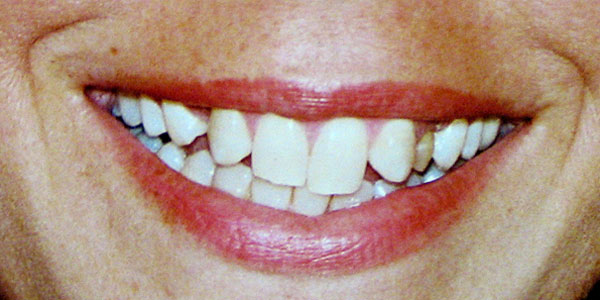
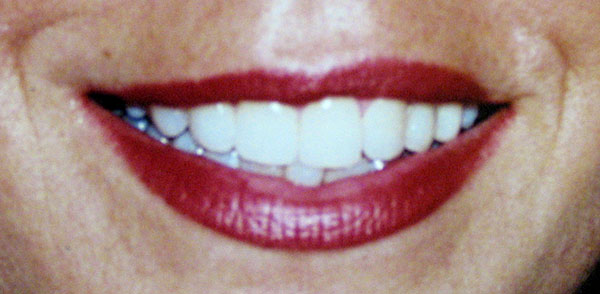
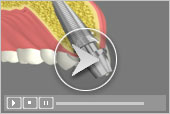
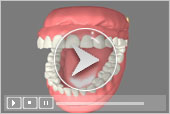
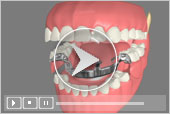
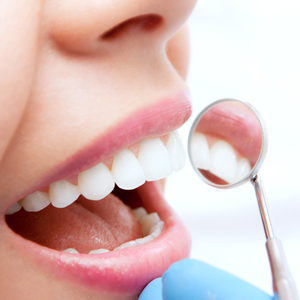 General Dentistry
General Dentistry
 Invisalign
Invisalign
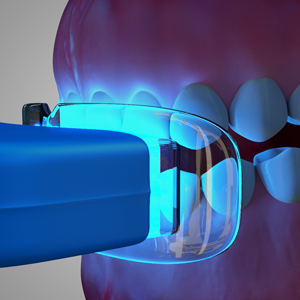 Tooth Whitening
Tooth Whitening
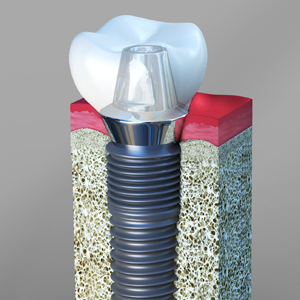 Dental Implants
Dental Implants
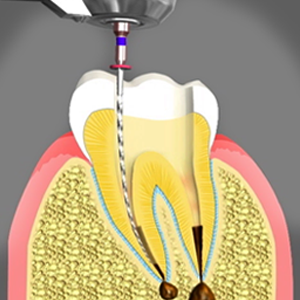 Root Canals
Root Canals
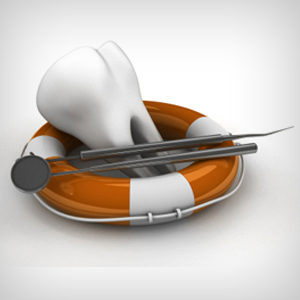 Other Services
Other Services





